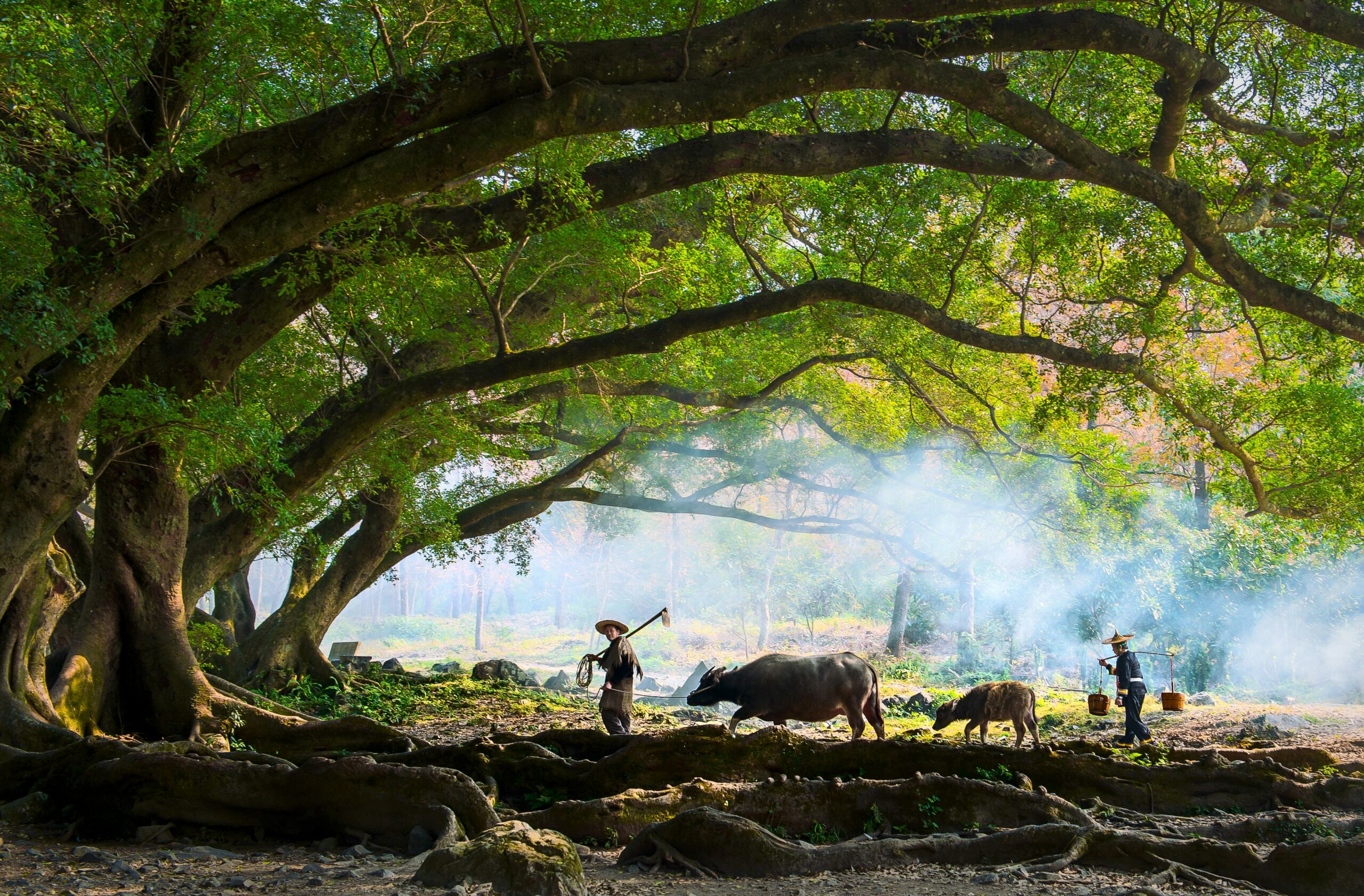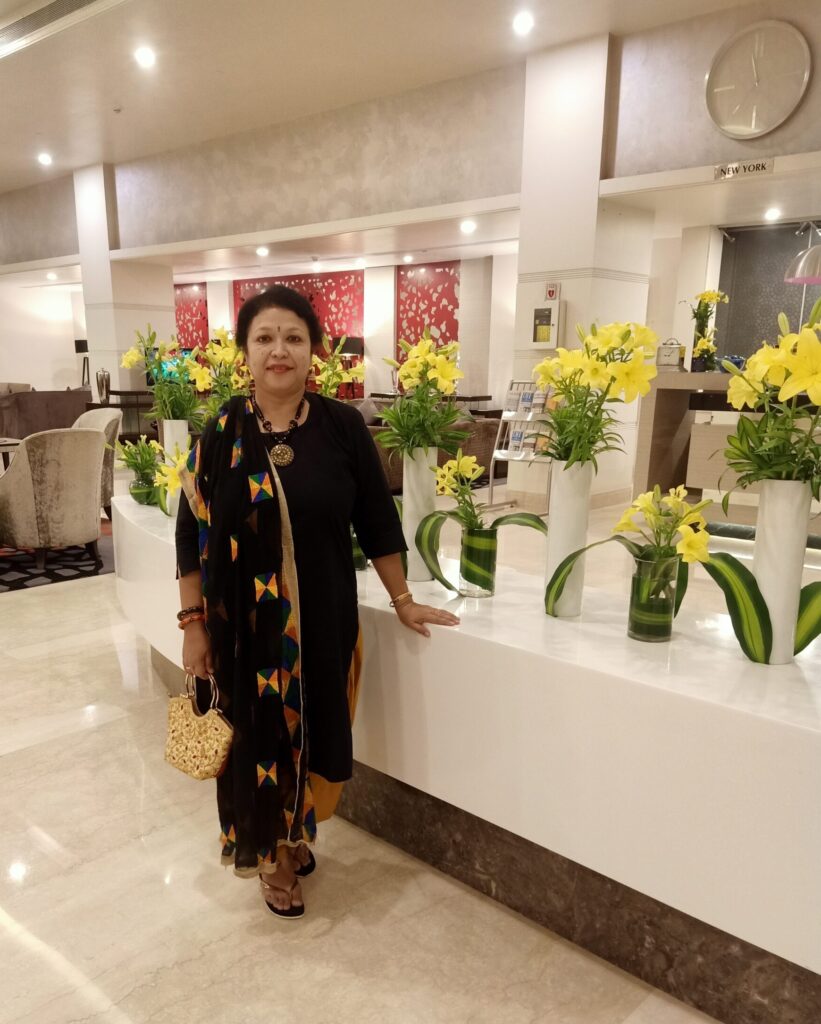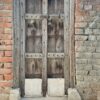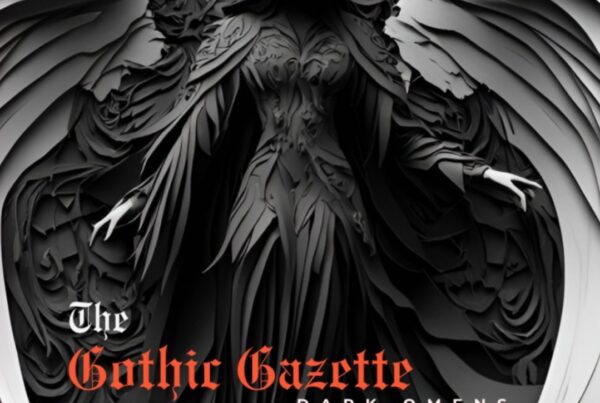This short fiction, based loosely on the horrific unrest witnessed in Manipur in recent times, was published in the UK-based Fem Asia magazine in July, 2024 – a publication that strives to amplify the voices of South Asian writers.
“Is the meat ready? How long does it take to cook, you lazy bitch?” I vigorously move the ladle in the wok as Salailen hollers from the living room. “And make sure you make it red hot and spicy – not the bland broth you churned out last time!” His words, dripping with derision, rasp across the length and breadth of the modest dwelling, before they hit my ears.
I place the smoking hot pieces of goat meat on a bed of rice on the leaf plate, along with some raw onion and green chilli. The gravy is still simmering, tiny air bubbles sputtering and dying in a pool of luscious, tomato-red, tempered sauce. The tantalising whiff tells me that the taste will be to Salailen’s liking.
So finally, will it be a no-kicks-and-punches night, today? A tiny hope peeks in my heart. I quickly diss it and focus on the task at hand. The side of a watery yellow lentil along with scrambled egg are more like a formality, a necessary embellishment. I cook such extras every evening, knowing fully well they wouldn’t be touched. But Salilen likes to be served like a king. A three-course meal along with prawn pickle, salads, and his preferred poison, Yu – an alcoholic drink made from fermented rice. But who am I to say no? It is his house and his fiefdom, where he reigns supreme. As for the discarded food, there are always dogs roaming the area. Feral watch dogs with an appetite as massive as that of Salailen, their patron.
If gluttony had a face, it would probably be that of this self-styled malefactor. Slurping, spilling, juices dribbling, wolfing down the food as if it were his last meal on earth. A burly, swarthy man, with a thick curly mop, unwashed looks, and a perpetually foul, alcoholic stench that often makes me gag. He is barely seen during the day, though I occasionally hear his gruff voice booming across the immediate precincts. Luckily, our paths don’t cross too often. My presence is confined to the kitchen, and the two-room outhouse where I stay.
I discreetly serve him dinner in the main hall and leave. Thereafter, I resign myself to another insipid evening in my room, if I can call it one. A ramshackle brick and mortar hut with a puckered asbestos sheet for a roof. Last night’s light shower led to a steady trickle in several places. I live in a state of constant trepidation, confined to this space for the past four months. My core job is to keep an eye on the girls brought here. They come in ones and twos, abducted and dumped in the room next to mine, for physical pleasure. I feed them twice a day, and inform Salailen or his cronies in case of a death. Like these girls, I, too, am a prisoner. A Dalit prisoner, kept alive, to serve the masters. Maybe my cleft palate and polio-afflicted legs have rendered me ugly…undesirable. The only physical abuse I receive are the blows and punches that rain whenever I fail in my daily household duties.
I peer out of the lone window. The woods are the same oranges, rusts and yellows at this time. With fall just round the corner, the trees look mellow, shorn of their monsoon verdure that these parts are famous for. The mild, woodsy scent of the red oleander wafts in from the green patch outside. Not a garden, really…just a grassy area hemmed in by some flowering plants. And miles of uninhabited forested land beyond that. But I don’t have the luxury of admiring the forests any more. Those were the little joys – those days of gay abandon – that ended abruptly with my childhood.
*******
Childhood and adolescence were my happy spaces. Leishi, Monobi and I made for the most carefree, ebullient trio – more friends than sisters. Kanai, of course, had his own guy gang – he would die rather than be seen playing with his sisters! Baba often played the flute while Ima sang in her usual off-tune voice. Baba bought us toys from the annual village mela – human figures, kitchen set, pistols, drums. The valleys and the lush fields echoed with our laughter. Sometimes, we cooked up stories of our shenanigans with the cobra lily and the red oleander – poisonous shrubs with an intoxicating fragrance – just to tease Ima. Stay away from them…even smelling them can kill you, Ima would warn us in her shrill, agitated tone. Birthdays and festivals were made extra special by Ima’s signature ooti, iromba and kangshoi. I still carry memories of our tiny kitchen, of Ima wiping her greased, calloused palms on her turmeric-stained tunic after putting the jars of shrimp pickle out in the sun. Her whiff probably makes the squalor here a tad bearable.
And then we grew up some more. The green horizon turned ashen and we inhaled air that smelt of gunpowder and gore. Our toy guns and clay figurines got replaced by real weapons and men in khaki and camouflage. And many of them in mufti, too. Men, or should I say demons, who did not bat an eyelid before dragging my sexagenarian father out of the washroom. We were playing ludo – our last game together as family. Leishi had cast the die and it twirled and pirouetted before resting at a six. The ludo dice and coins lay scattered all over the floor – small colourful discs rolling free and happy.
The men barged in through the entrance. The wooden door was rickety and needed repair. It creaked and groaned in protest, and finally surrendered to the heavy pummelling.
“Let Kanai start working in the fields, we’ll get the doors changed with his first salary.” Baba had said, his hoary, cataract-infected eyes, twinkling at the prospect of seeing his young son take on the baton of breadwinner from him. That, of course, remained a distant dream.
Baba was mid-shower and could barely manage to wrap the checked lungi around his emaciated waist, before being whisked away. His reflexes had slowed down. Years of arthritis, left untreated, had rendered him sluggish and largely inactive. Ima’s tear-stained face, her red, swollen, panic-stricken eyes seemed to scream out to us — forty-four years of partnership struck down in one cruel blow! She lost the will to live, and died shortly thereafter.
Baba had put up a brave front before the men, I gathered later. He relentlessly insisted that he had nothing to do with the insurgents. And neither did his son. But men in power seldom listen to the feeble voice of the powerless. More so, if he happens to be a dalit – the forgotten community spread across the region. Living on the fringes of society, we were the scum of the earth, waiting to be crushed under the grubby, sodden boots of those men. The way they trampled over the tender, young shoots in our paddy fields. Or marched noisily across the bumpy, uneven village paths, jeering and leering away at the young girls returning home with hay stacks deftly balanced on their head. Their brazen hands brushed across the women’s breasts as they erupted into a raucous laughter.
They invaded the market places, picking fruits, vegetables and staples without a care. Anyone who dared asking them to pay up was smacked hard across the face. They groped the women unabashedly, paying scant respect to the CCTV installations in the area. They were, after all, the uncrowned kings of the area. And we were their subjects, grovelling before them, begging for mercy.
After some time, I could no longer distinguish between khaki and camouflage. I heard disjointed terms like militants, insurgents, soldiers, police. One was a part of the state machinery, while the other was fighting it. But for groundlings like us, both epitomised sheer evil. I never liked the military paraphernalia they flaunted – rifles, badges of honour, epaulettes, emblazoned caps, and all such trappings. The men in the military suspected us of having links with the insurgents. Of offering them monetary help, food, daily essentials, and even shelter. So, they harassed us, incarcerated us, without reason or proof. Similarly, the rebels dressed in army fatigues threatened and warned us against aligning with the military. Against disclosing their whereabouts to the security forces.
With no ground underneath and no roof overhead, we were destiny’s cursed children – birthed on a whim, disowned at leisure. Our homeland, our erstwhile safe space, had become our most perilous territory. We were, forever, walking on thin ice, living a dystopian life in an altered reality. Only our insides rumbled…nay, screamed. Screamed for justice, for an end to this Sisyphean nightmare. And from the ashes of our dashed dreams and dignity, was born the seed of a hunger – a hunger for revolt and reparation.
The ministers, sitting in their air-conditioned mansions in the capital cities, waxed eloquent on how the daughters of the land needed to be protected. The more ambitious ones shed tears. Our village had a few houses that had escaped the carnage. The news blaring from their television sets would air voices of concern – voices of newscasters, panellists, NGO-owners, human rights activists, and administrative biggies, all sitting in a utopian universe, complete strangers to this convoluted reality. Had any of them ever gone without a meal? Had anyone seen their homes razed and set on fire, the flames devouring their humble dreams and minimal resources? Had a single member of these committees ever visited an open field on a cold, windy evening, lifting shrouds from the faces of multiple decapacitated corpses, in the feeble hope of tracing their father or brother? And identifying them with the help of the maroon slippers or the white-and-blue lungi that had been bought from the mela the previous year?
Come sunset, casting aside all differences in oath and ideology, both parties morphed into beasts of terror. Beasts who were drunk on power (alcohol was a close second), who wielded guns with the ease of a seasoned sniper. And most importantly, beasts who demanded carnal gratification from the very people they unleashed terror on. And thus, my once verdant meadows soon turned into murky killing fields. Headless torsos, mutilated bodies of women, lifeless naked children, formed the harvest this time. The waters, our lifeline, earlier used for nourishing crops, were now pumped in to wash off the stale, sickly blood trails. Green no longer stood for all things calm and peaceful. In fact, it came to symbolise terror, revenge, libido, and murder.
*******
The dim, spindly light sneaking in from the bulb outside, through the small window with iron grille, is my only source of air and light in this hell hole. Complete darkness suffocates me. I gasp for breath, as if strangled under the weight of my lived experiences and memories. Memories of Kanai, for instance. My 17-year-old baby brother who was casually picked up from the kuccha path outside our house. He was headed home after a long day’s work in the fields. They bundled him up on a motor cycle and threw him into the lock-up. The daily quota of arrests had to be filled up, you see. His helpless, agonised screams, punctuated by the sharp thud of the heavy, iron-bound bamboo stick on his adolescent body, rent the night sky in this godless universe.
I retreat in dismay as the sound of creaking boots and cheap cigarette smell from outside, invade my nostrils. The adjoining room reeks of a nauseating mix of sweat, semen and sadism. The girls that are lodged there are a travesty of life. Frail, puny frames… or rather, silhouettes… walk in, with laboured, unsteady steps. Further anguish awaits them as the men walk in at random and force themselves on the hapless girls, never failing to singe them with uncouth remarks of their lowly caste and social standing. As if, girls born into dalit homes are obligated to endure this fate. Ravaged beyond repair, they wait to embrace death. Powerless to abate their woe or help them escape, I can only watch in horror. The truncated whispers I’ve picked up in these past few days have bolstered my belief that no one leaves this place alive. Is this a purgatory, I often wonder?!
Sound sleep has long eluded me – we do not see eye to eye. As the night drags on, I doze off fitfully, only to be woken up by a whimper and some cuss words hurled indiscriminately. A new entrant, I sigh. Once the footsteps have retreated, I tiptoe to the other room. I peer closely at the two girls brought in – and immediately wish I hadn’t! It’s my darling sisters, now reduced to a heap of flesh and bones, without a thread on them. One is my Monobi, all of nineteen. Once blessed with porcelain skin and a lithe figure, her body now lies lifeless, distended, curled at a horrible angle. And next to her lies Leishi – her swollen, fissured lips tell a thousand stories; her once twinkling eyes full of dreams, now look blanched and death-like.
Leishi was the spunkiest among the three of us. Smart, attractive, intelligent – she harboured aspirations of becoming an actor. People often mocked her for her daring.
“Look at that wench,” they would sneer, “living in a hut and dreaming of a castle in the skies! She’ll probably end up in a whore house even before she reaches the movie studio!” Their lewd looks and gibes soon became a community pass time. In our village, Dalit girls were not permitted to hope or dream, much less take steps to realise them.
Leishi is alive. I see a glimmer of recognition on her face. Her breathing is loud and laboured, as she struggles to narrate her journey to hell.
As she and Monobi were returning home from the market two days ago, with bags of rice and vegetables, a bunch of motorcycle-borne miscreants of the dominant social group rammed to a halt in front of them. Leishi whispered into my ears how the entire village watched in mute connivance, as the two girls were ruthlessly stripped and paraded naked along the path, leading to the open field. Not a voice of protest, nor a single hand raised to fight or impede. No one came forward to throw even a towel on the helpless girls. Still on their bikes, they dragged them by their hair into the field. And then it was a free-for-all for the monsters till Leishi and Monobi could fight no more. Monobi succumbed to the torture while Leishi ended up with me in this godforsaken corner of the village.
Perhaps it is destiny that has united us, sisters, in this macabre setting. Even while one is hanging on to life by a thread, and a prayer.
And now that thread snaps. Leishi departs, after playing her part well.
Alcohol has a funny effect on people – it makes them blurt out truths at the most unlikely moments. While the men outside celebrate their triumph over my sisters’ bodies and revel in their bacchanalian pleasures, I pick up every word they say. I close my eyes and visualise the scene — pieces of clothing, trinkets, and slippers strewn all over the grass and the bushes. It was the same field where we ran and played as kids, where every tree was a part of our hide-and-seek games. It was the very field which, once, provided us with shade and succour. And now, once again, it drew the girls into its womb to shield them from further torture.
We, the lowly women, and our bodies, forever remain instruments to be wielded in times of conflict or unrest. Weapons of revenge and retribution used by one community to settle a score with another. The girls who once tried to reach for the stars, were brutally thrust into the bowels of the earth. Their only fault – they belonged to a marginalised community. Thus, these grounds bury so many tender dreams, stifle innocent voices, and clip countless wings before they can take flight.
Such incidents follow a routine trajectory – they jolt the living out of their sense of smugness. This is followed by newspaper headlines, candle light vigils and prayer memorials. And when this routine is done, people return to their mundane, timetabled existence where mothers cook and pickle for their children, teenage boys help out their fathers with the crops, and young girls sing and frolic in the green fields. At sunset, they dutifully return to the comfort of their homes, like birds returning to nest at dusk. Occasionally…just sometimes…some of them don’t. Like those rare birds who lose their way and go astray, never to return to their familiar folds again. Frankly, no one bothers. No one keeps count of those birds lost in flight. Or the girls who never returned from their playing fields or the crowded market place.
**********
I mourn the loss of my sisters the entire night. I bellow, rant, and shriek, all in silence…within my heart. The next morning their bodies are dragged away unceremoniously. I watch it all, hiding behind my door, swallowing my tears. The oleander has bloomed in all its crimson glory but today, its whorled beauty and fresh floral scent seem to grieve along with me. I head to the kitchen with leaden steps. The meat cries for my attention, while my heart feels like a spiralling tornado, ready to burst open the dams of anger and grief. Suddenly, I feel ravenously hungry. But food does not appeal to me. I wait for the feeling to pass.
I decide to whip up something special for Salailen, even if it is only to buoy his pride and escape his wrath. I spend an inordinately long time, preparing today’s meal. Some special ingredients are pounded and added. The meat feels succulent while the gravy looks flaming red, spicy and flavoursome. I place the food in the hall for the devil and his three allies.
The men have a voracious appetite today. They engage in animated discussions spewing the choicest expletives, and occasionally explode in a rapacious laughter. But most of all, they relish the finger-licking goodness of the food.
I sit on the kitchen floor, like every day, waiting for them to finish. As the minutes tick past, I turn mildly fidgety. I rise, and start to pace up and down the tiny space.
What’s taking so long? Are they still eating? How much longer will they drag it?
And then, I hear it. A loud thud, and the sound of a steel glass rolling and twirling on the floor before coming to a stop. A few incoherent sounds…more like garbled words…before complete silence descends on the house. I clutch my chest to arrest the hammering of my heart against the rib cage, and sneak into the room where the men were eating.
A ghastly sight awaits me. Slumped against the chair is Salailen while his three henchmen lie sprawled out on the floor at various angles – motionless, eyes half open, their mouth and fingers still coated with food. The object of their craving – the appetising lamb curry – is almost over, with some residual juices lining the vessel. I creep silently towards each of them to make sure he is dead. Satisfied, I plonk myself on the spare cane chair, and take in the scene. In the weak yellow shaft of light, this spectacle of death looks even more eerie. But infinitely more gratifying. Surprisingly, the pangs of hunger wringing my innards are steadily easing out.
Without further ado, I limp towards the kitchen one last time. I bend down to pick up the can of kerosene and the matchbox – instruments used to pander to their insatiable gastronomic demands, now ironically reduced to a cleansing and purging agent. As I leave, a familiar whiff tingles my senses. My eyes fall on a tiny, unobtrusive patch of red on the floor – a few petals and crushed seeds of the red oleander, with remnants of a red paste sticking to the granite mortar and pestle, my most reliable cooking tool. My lips curve into a wry smile as Ima’s words ring in my ears – even smelling them can kill you!
Never underestimate the wisdom of your elders, I remind myself.
It’s almost midnight when I finish sprinkling the blue liquid at vantage spots in the house. I place some liquor bottles at the dining site as evidence, should someone bother to investigate. With short, determined steps, I hurry out of the house, tossing some lighted matches inside. An acrid smell rents the air. A dry, autumnal breeze fans the flames as tangerine ribbons hungrily lick the night sky. With no one around to help or rescue, the inferno rages for as long as I can see it before I hobble out of the area, disappearing into the dark fields.
After four gruelling months, I finally walk free. I tread the fields of my village, my childhood haven. But something has changed irrevocably here. The open spaces feel alien. And hostile. The air reeks of betrayal, and the loss of innocence. There seems to be a scarlet haze all around as the winds moan and wail. Are the fields mourning the innocent blood that has been spilt on their bosom? I look at the heavens above for answers – a yawning chasm greets me.
(Story only – 3570 words)
P.C. Zhengfan Yang on Unsplash
Glossary: Ima – Manipuri term for mother
mela – fair
ooti, iromba and kangshoi – Manipuri delicacies
lungi – a wrap-around lower garment for men









